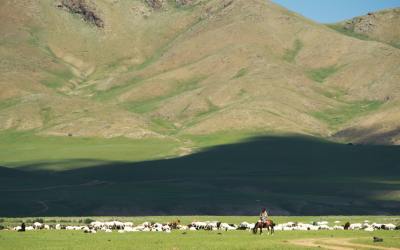ICOMOS Launches Initiative to Highlight the Heritage Value of Transhumance Cultural Landscapes
 Led by ICOMOS and supported by the State Tourism Agency of the Republic of Azerbaijan, the project "Defining a thematic approach towards sustaining transhumance cultural landscapes in a changing environment" aims to address the complex environmental, cultural and social dimensions of transhumance, promoting international cooperation and building awareness of its contribution to the heritage of humanity.
Led by ICOMOS and supported by the State Tourism Agency of the Republic of Azerbaijan, the project "Defining a thematic approach towards sustaining transhumance cultural landscapes in a changing environment" aims to address the complex environmental, cultural and social dimensions of transhumance, promoting international cooperation and building awareness of its contribution to the heritage of humanity.
Transhumance is the traditional practice of seasonal livestock movement, which involves the migration of human communities along with their herds. Since prehistoric times, transhumance has exemplified the sustainable use and intelligent adaptation to often inhospitable environments amid changing climatic conditions. It has ensured food security for communities and promoted social, economic, and cultural exchanges between sedentary and transhumant peoples.
The World Heritage Transhumance Initiative is underpinned by the perceived global importance of transhumance as a complex social-economic system and the need for better-integrated multidisciplinary research for the protection of the cultural, natural and mixed landscapes related to transhumance. The project aims to strengthen the representation of properties illustrative of transhumance to the World Heritage List, facilitate their recognition in other relevant international programmes and address the key management challenges at stake. It also focuses on the opportunities linked to the safeguarding and transmission of these heritage places to future generations.
In 2025, an international conference on Transhumance Cultural Landscapes will be held in Azerbaijan to discuss the heritage values of the transhumance way of life. Other key activities involve the general gathering of information on good practices, documentation and climate resilience as well as recommendations for improving management policies, strategies and actions towards a sustainable transition into the future of these landscapes. The project deliverables will be disseminated to professional audiences, policy-makers and the general public through print/digital publications and other digital media.
Ultimately, the project is expected to stimulate interest in transhumance cultural landscapes and raise awareness to their contrubition to the heritage of humanity as well as to their potential role in responding to climate change and other global challenges.
See more
